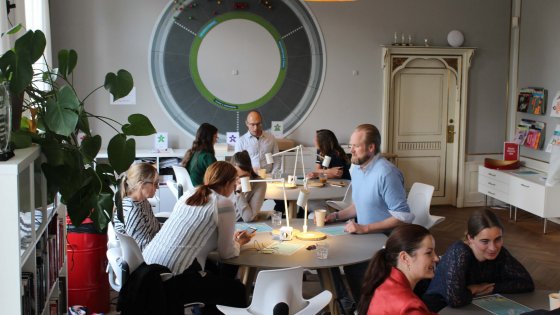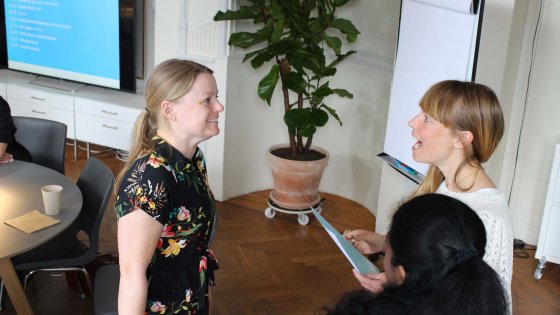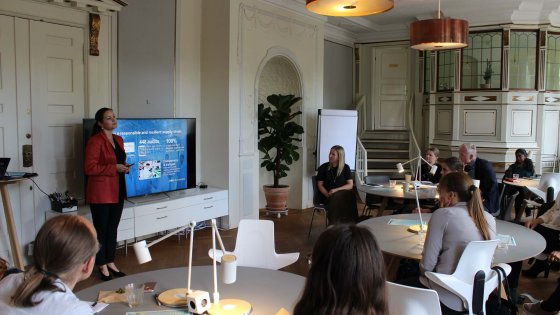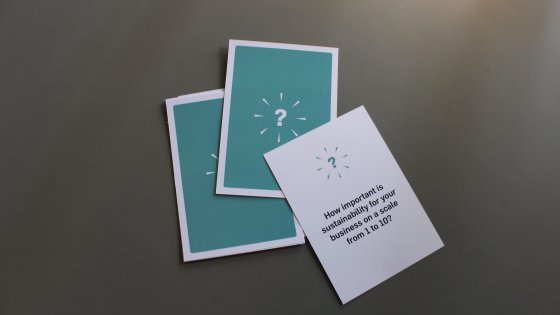-
 Sharing stories and perspectives
Sharing stories and perspectives -
 Novo Nordisk, FL Smidth and Workz during participant interviews
Novo Nordisk, FL Smidth and Workz during participant interviews -
 Louise Koch, Corporate Sustainability Director at Dell
Louise Koch, Corporate Sustainability Director at Dell -
 Reflection questions up for grabs
Reflection questions up for grabs
Our symposium on sustainability brought insightful people from Tryg, Ørsted, ISS, Berendsen and FLSmidth among others to the Workz office. The afternoon was dedicated to discussing the “hows” of sustainability, exemplified by cases presented by Dell and Novo Nordisk.
EDUCATING SUPPLIERS AND INVOLVING EMPLOYEES AT DELL
In a company the size of Dell - one of the largest technological corporations in the world - the extensive supplier network is one of the obvious places to start when looking at impactful sustainable practices. Especially since electronic waste has become the fastest growing waste stream in the world, as Louise Koch, Corporate Sustainability Director at Dell made known. From Dell’s perspective, some suppliers feel motivated by the company’s sustainability agenda, others feel a gentle pressure going through mandatory, third party audits.
Nevertheless, Dell operates with invariable demands for all suppliers across markets. As a supplier, you must comply with the Responsible Business Alliance Code of Conduct, a leading framework in the IT industry, and the same goes for suppliers of suppliers. This framework is aligned with standards from the United Nations and OECD and presents requirements not just for environmental protection, but also health and safety, business ethics, labour rights, and management systems. This is the name of the game when doing business with Dell and the audits formed on this basis is an anchoring point in ensuring supply chain responsibility.
The sustainability mindset is nothing new at Dell. Over a decade ago, the company started using post-consumer recycled plastic from water bottles and CD cases for their desktops and monitors. Today, Dell is part of the NextWave initiative working with partners to catch plastic before it reaches the ocean in an effort to keep it in a closed loop supply chain. An overlooked resource if you ask Dell. This means Dell is not only extending the lives of their own products through take-back programmes, but also integrating ocean-bound plastic in the production of e.g. the packaging of new laptops.
A lot can be done by pulling the big levers through programmes, rules, regulations, and audits. And granted, action of this scale is what stakeholders, not least the public, are asking and expecting of sustainable businesses today. But in the day-to-day work, Louise sees the small steps towards a company culture with a truly sustainable mindset as the awareness of her colleagues increases. Thinking sustainability is first and foremost, but not solely a job for the CSR department. There is a task in educating and involving employees from sales and marketing to R&D and in doing so, employees get the agency to contribute, foster and share their own ideas on sustainability from e.g. a sales perspective. A valuable lesson learned as Dell look towards the development of their 2030 sustainability strategy.
AIMING FOR CIRCULAR ZERO AT NOVO NORDISK
As with any type of organizational change or initiative you need buy in to get momentum before even thinking about succeeding. At Novo Nordisk, Project Lead in Corporate Environmental Strategy, Nanja Hedal Kløverpris stresses the importance of having top management on board in the company’s new Circular for Zero ambitions, which include reducing supplier footprints, assisting affiliates in going green and designing products for circularity.
In addition, she pointed to the fact that nowadays companies with green agendas are supported or pressured depending on your efforts by a global momentum fueled by the political discussions on climate. This global awareness is a welcome catalyst in Nanja’s work. This work is also critical in Novo Nordisk's attempt to attract the best talent because as younger generations in particular expect their future employees to express and act on a concern for sustainability.
Circular for Zero is the name of Novo Nordisk’s new strategy for sustainability, and even if you are new to the sustainability area, you might get the tinge of a very ambitious project. Novo Nordisk aim to have zero impact – Yes, zero impact on the planet whatsoever. In order to reach that ambition, Novo Nordisk is going to embrace and implement a circular mindset on all levels guided by 7 projects within the three categories supply, company and products:
- Reduce supplier footprints
- Ensure circular procurement
- Get operations to zero Co2
- Eliminate waste of energy, water and materials
- Support affiliates going green
- Design products for circularity
- Solve end-of-life product challenge
The projects are by no means all settled, but the ambitions are high and so are the stakes. Novo Nordisk is balancing two major tasks: being committed to the Circular for Zero plan and in doing so not compromising their promise to improve patients’ lives.
Admittedly, this can be a challenge according to Nanja. For instance, some drugs are better suited to be administered with injection devices, the same devices that eventually end up in landfills. So what should be the primary concern? It’s about striking a balance and Novo Nordisk accept a bigger footprint in places where they help the most patients.
Nanja pointed out that change within the pharma industry is usually slow, seeing that product development is very time- and resource demanding. So decisions made today on new circular designs might not be visible for patients within the next 5-8 years or more. But that only emphasises the need to start designing circular products for lasting change today.
Novo Nordisk is not only looking at how their products affect the world, they are also looking inside the organization to see how they can change the whole mindset to Circular to Zero. So far, they have banned single use plastic, such as balloons, cups, straws and plastic bottles. It may seem more symbolic than effectful, but it is an important step to start changing the mindset within the organization and getting everyone on board the Circular for Zero strategy.
There is no doubt we are facing major challenges in terms of sustainability, however, the discussions among participants at the symposium made it clear that we are not alone on this journey. Across companies and industries, we do have similarities to build on in helping and inspiring each other to put action behind sustainable thinking.
We thank all our guest and expert speakers for making the day a great success. If you want to make sure do don't miss our news and events, sign up for our newsletter Friends of Workz or follow us on LinkedIn, Facebook or Twitter.

